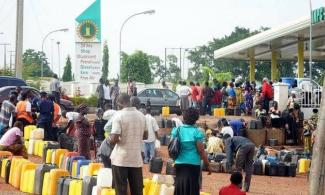
This was made known by the NNPC Executive Vice President, Downstream, Adeyemi Adetunju, while addressing a news conference in Abuja on Tuesday.
The Nigerian National Petroleum Company Limited (NNPC) has said the fuel queues in Lagos State and Abuja is as a result of some construction projects going on in the state.
This was made known by the NNPC Executive Vice President, Downstream, Adeyemi Adetunju, while addressing a news conference in Abuja on Tuesday.
He claimed that the fuel gridlock was easing out and NNPC had programmed vessels and trucks to unconstrained depots and massive load outs from depots to various states were closely being monitored.
He however assured Nigerians that efforts were ongoing to ensure that normalcy returns as soon as possible.
He said, “The recent queues in Lagos are largely due to ongoing road infrastructure projects around Apapa and access road challenges in some parts of Lagos depots.
“The gridlock is easing out and NNPC has programmed vessels and trucks to unconstrained depots and massive load outs from depots to various states are closely being monitored.
“Abuja is impacted by the challenges recorded in Lagos. NNPC Retail and key marketers have intensified dedicated loading into Abuja to restore normalcy as soon as possible.
“We want to reassure all Nigerians that NNPC has sufficient products, and we significantly increased product loading including 24-hour operations in selected depots and extended hours at strategic stations to ensure products sufficiency nationwide.
“We are also working with the NMDPRA, MOMAN, DAPPMAN, IPMAN, NARTO, PTD, and other industry stakeholders to ensure normalcy is returned.
"The NNPC has a national PMS stock of over 2 billion litres. This is equivalent to over 30 days of sufficiency," he added.
The scarcity of petrol in Lagos, Abuja, Kano, Kaduna and other parts of the country is taking a new dimension as marketers have alleged racketeering at the depots.
Besides, the price of the product has gone past N180 per litre, although not the official rate, but largely used by major petrol stations in Abuja, nearly a month ago.